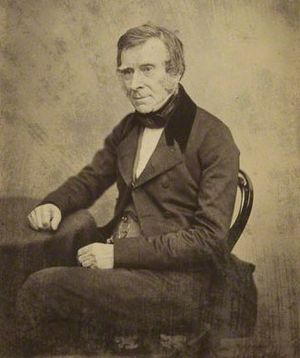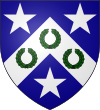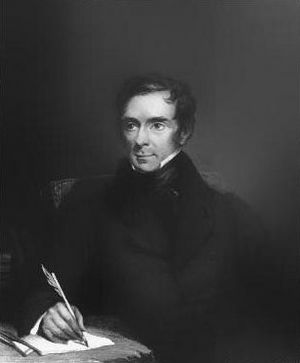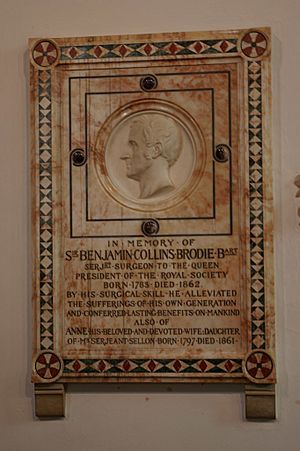Sir Benjamin Collins Brodie, 1st Baronet facts for kids
Quick facts for kids
Benjamin Collins Brodie
|
|
|---|---|

Sir Benjamin Collins Brodie, 1st Baronet
|
|
| Born | 9 June 1783 Winterslow, Wiltshire, England
|
| Died | 21 October 1862 (aged 79) Surrey, England
|
| Nationality | English |
| Scientific career | |
| Fields | Physiology |
| 29th President of the Royal Society | |
| In office 1858–1861 |
|
| Preceded by | John Wrottesley |
| Succeeded by | Edward Sabine |
Sir Benjamin Collins Brodie (born June 9, 1783 – died October 21, 1862) was a famous English doctor. He was a physiologist, who studies how living things work, and a surgeon, a doctor who performs operations. He was a pioneer in studying diseases of bones and joints.
Contents
Early Life and Medical Training

Benjamin Brodie was born in Winterslow, a village in Wiltshire, England. His father, Reverend Peter Bellinger Brodie, taught him at home when he was young.
In 1801, Benjamin decided to become a doctor. He moved to London to study medicine. He attended lectures by a famous surgeon named John Abernethy.
Two years later, in 1803, he became a student of Sir Everard Home at St George's Hospital. This was a very important hospital in London.
In 1808, Brodie became an assistant surgeon at St George's Hospital. He worked there for more than 30 years, helping many patients.
Contributions to Science and Medicine
In 1810, Benjamin Brodie was chosen as a member of the Royal Society. This is a very old and respected group for scientists. Over the next few years, he wrote several important papers for them. These papers described his new discoveries about how the body works.
He also became a foreign member of the Royal Swedish Academy of Sciences in 1834. This showed that his work was recognized around the world.
Understanding Joint Diseases
Brodie quickly became a very busy and successful surgeon. He wrote many articles about surgery for medical journals.
His most important book was published in 1818. It was called Pathological and Surgical Observations on the Diseases of the Joints. In this book, he looked closely at how diseases start in the different parts of a joint. He also explained how pain can show what kind of disease someone has.
This book changed how doctors treated joint problems. Surgeons started using less extreme methods, which meant fewer people needed to have their limbs removed. This saved many limbs and lives. He also wrote about diseases of the urinary system and nerve problems that needed surgery.
Exploring the Mind
In 1854, Brodie published a book called Psychological Inquiries. At first, he didn't put his name on it. This book explored how the human mind works. By the third edition in 1856, his name was on the cover.
Eight years later, in 1862, he published a second part of the book. This part discussed the physical and moral history of humans.
Royal Service and Honors
Benjamin Brodie received many awards and honors during his career. He was a doctor to the Royal Family, starting with King George IV.
He also served as a surgeon to King William IV and Queen Victoria. In 1834, he was given the special title of baronet.
He became a member of the French Institute in 1844. He also received an honorary degree from Oxford University in 1855. In 1858, he became the president of the Royal Society. Later, he was the first president of the General Medical Council, which oversees doctors in the UK.
In 1858, the famous book Gray's Anatomy was dedicated to Sir Benjamin Collins Brodie. This book is still used today to teach about the human body.
Later Life and Legacy
Sir Benjamin Collins Brodie passed away on October 21, 1862, at his home in Broome Park, Surrey. He was 79 years old and died from a shoulder tumor.
After his death, his collected writings and his own life story were published in 1865. His work continues to be important in the history of medicine.
In 1816, Brodie married Anne Sellon. They had several children, and three of them lived to be adults. His oldest son, also named Benjamin Collins Brodie, became a well-known chemist at Oxford University.
See also
 | James B. Knighten |
 | Azellia White |
 | Willa Brown |



